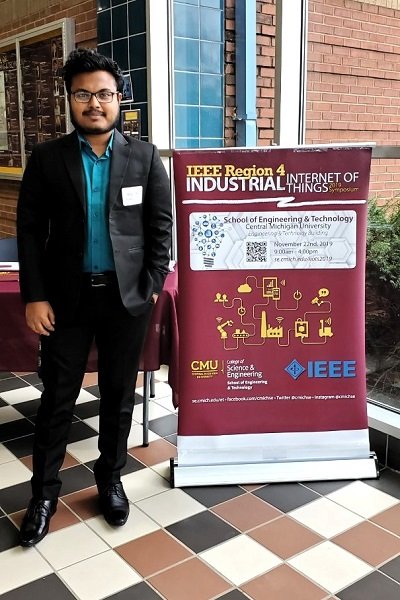Algorithmic Accuracy
In a joint effort, Engineering and Technology professor Dr. Ahmed Abdelgawad and graduate student Khandaker Foysal Haque developed a new method to detect COVID-19 with a 98.3% accuracy. The team used deep learning, a system of algorithms that allows machines to mimic human behavior, to detect COVID-19 in patients’ chest X-ray scans.
 Deep learning uses a multi-layered structure of algorithms, known as neural networks, that resemble the makeup of the human brain. The algorithms build off prior experience and analyze data to help machines perform tasks humans typically do, like identifying patterns and classifying information. When applied to medicine, deep learning algorithms can play a significant role in the automatic diagnosis of diseases.
Deep learning uses a multi-layered structure of algorithms, known as neural networks, that resemble the makeup of the human brain. The algorithms build off prior experience and analyze data to help machines perform tasks humans typically do, like identifying patterns and classifying information. When applied to medicine, deep learning algorithms can play a significant role in the automatic diagnosis of diseases.
Training the deep learning algorithm to predict COVID-19 accurately required a large dataset of chest x-ray images. Because Dr. Abdelgawad and Haque’s research began during the early stages of the pandemic in May 2020, collecting the vast dataset was challenging. After extensive searching, they located data from an open access Github repository, a platform where individuals can exchange and store files.
Dr. Abdelgawad and Haque’s paper “Automatic Detection of COVID-19 from Chest X-ray Images with Convolutional Neural Networks” explains their initial research of deep learning algorithms to detect COVID-19 with a 97.56% accuracy. As more X-ray images became available, the team’s dataset grew, improving their algorithm significantly. Their journal article “A Deep Learning Approach to Detect COVID-19 Patients from Chest X-ray Images” published in AI MDPI highlights their new findings of COVID-19 detection at a 98.3% accuracy.
Detection of COVID-19 plays a vital role in preventing its spread. Dr. Abdelgawad and Haque’s research demonstrates deep learning’s ability to accurately detect COVID-19 with limited time and resources, reducing the cost of testing substantially. As the access to more X-ray image data grows, their algorithm can be trained more extensively to achieve higher accuracy and make a greater impact on communities, something Haque strives to do through his research endeavors. With the prevalence of COVID-19 in our world today, he found a fitting opportunity to apply his knowledge of engineering and help our communities combat the pandemic with an innovative method of detection.
At CMU We Do Research, We Do Real World
Story by ORGS intern Brittney Rudat
July 2021